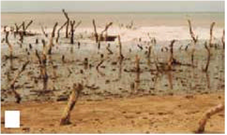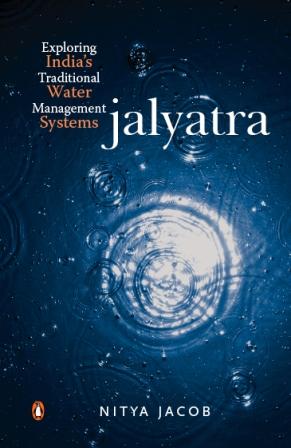/topics/governance
Governance
Environmental flows for Indian rivers:Need for a discussion to consider the health of the riverine ecosystems
Posted on 24 Apr, 2008 11:58 PMIndia is facing a water crisis in nearly all the sectors. Fortunately or unfortunately, measures taken by the related authorities to combat the crisis often depends on the amount of 'noise' made by the relevant stakeholders. It is no wonder then, that the urban India, and especially the rich and the powerful in urban India, seldom have to face problems related to water scarcity, water quality or the sheer inequity in distribution. On the other hand, weaker the stakeholder, more severe are his ( rather 'her') problems. Marginal farmers, tail enders in a canal network, rural and urban poor, especially children and women, stand testimony to this situation. We all agree to this, right? 
Godavari delta, destruction of mangroves
But aren't we forgetting the the weakest, and in some ways, the strongest, of all the stakeholders? How about the ecosystem of the river itself??
New book:"Jalyatra: Exploring India's Traditional Water Management Systems"
Posted on 22 Apr, 2008 04:50 AM The book published by Penguin India, explores traditional water management systems in 8 states of India, including Delhi, and is writte
The book published by Penguin India, explores traditional water management systems in 8 states of India, including Delhi, and is writte
Hiring at India Water Portal for a content and community manager
Posted on 29 Mar, 2008 10:49 PMWe are trying to find the right person(s) to grow the Portal team.
"Water MOVES"-Newsletter from SPWD
Posted on 24 Mar, 2008 08:36 PM "Water MOVES"is a quarterly newsletter from Society for Promotion of Wastelands Development. This issue contains an article on Integrated Water Resource Management by N.C.
"Water MOVES"is a quarterly newsletter from Society for Promotion of Wastelands Development. This issue contains an article on Integrated Water Resource Management by N.C.
Microfinance for safe drinking water-ACCESS & HUL partnership
Posted on 21 Mar, 2008 12:12 AMDrop by drop ACCESS & HUL in Base of Pyramid Partnership for Safe Drinking Water for Rural Poor:
Yakalakshmi lives in Nekkunda village, Telengana region in Andhra Pradesh with her husband and two children. Though she has water piped to her house by the village panchayat, her entire family fell ill for a month last monsoon season by drinking water directly from the tap. "We all got high fever and severe diarrhea", she says, "we had to spend around Rs. 4000 on health care, which was very difficult for us". So when she got the opportunity this January to buy an effective water purifier through her Self Help Group (SHG) on an installment basis she was one of the first to sign up. Yakalakshmi is just one of the beneficiaries of a unique tie-up between ACCESS Development Services, a microfinance technical services non-profit organization, and Hindustan Unilever Limited, one of the country's largest producers of fast-moving consumer goods, to provide safe drinking water to rural poor. "Most of these villages have piped water or boreholes", says Padma, Project Coordinator at a local NGO, PEACE, "the problem is that tests by UNICEF in this district show that up to 70 percent of these sources are contaminated."The contamination gets even worse during the rainy season, especially due to poor sanitation and waste-management practices.
"Tapping local innovation" contest: Last date is March 26th
Posted on 08 Mar, 2008 02:01 AM Last date for contest submissions is March 26th 2008 The Global Water Challenge (www.globalwaterchallenge.org) and Ashoka's Changemakers (www.changemakers.net) have launched a global collaborative competition to find the most innovative community-based water and sanitation solutions.
Last date for contest submissions is March 26th 2008 The Global Water Challenge (www.globalwaterchallenge.org) and Ashoka's Changemakers (www.changemakers.net) have launched a global collaborative competition to find the most innovative community-based water and sanitation solutions.
National Consultation Meet on developing a Citizens Report on water and sanitation in New Delhi
Posted on 18 Feb, 2008 10:29 AMA National Consultation Meet was organized by WaterAid towards developing a Citizens Report on Water and Sanitation in India was held on the 12th January 2008 at New Delhi.
Vijayawada Municipality : Subsidising individual piped water connections to the urban poor
Posted on 16 Feb, 2008 11:47 PMIn Vijaywada a determined effort has been made by the municipality to subsidize individual connection charge for the poor and break this entry barrier which prevents them from accessing piped water. An explanation of the details of the project. Should this be the approach for ensuring water for all?







